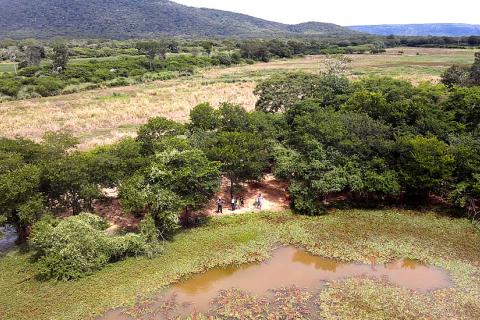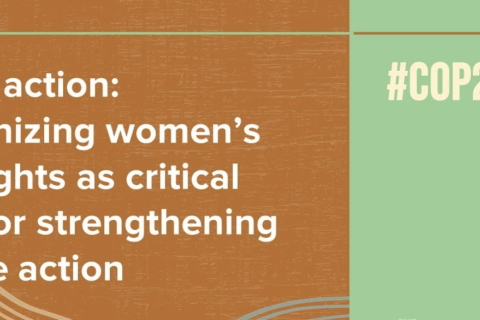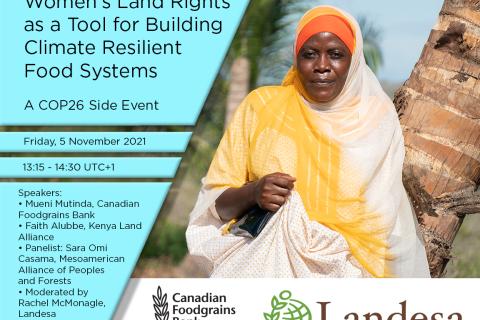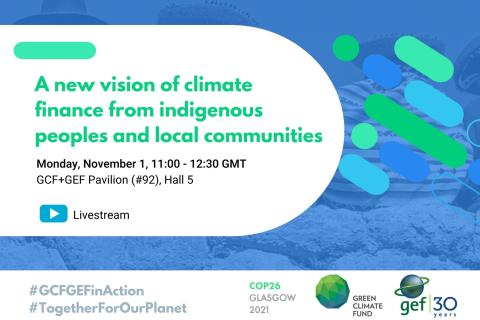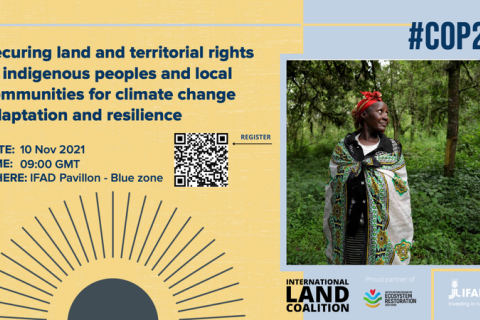

Related content:
They work the land. They protect the land. Does COP26 notice?
Indigenous peoples and local communities are included in the final version of the 26th session of the UN Climate Change Conference of Parties (COP26)’s decision text, a definite success compared to previous years. Direct financing for these groups has also been celebrated as a key success at COP26. However, how much progress was actually made, and which groups were kept on the side-lines? Many challenges still remain, and there is more to be done to include farmers’ voices in key discussions and decision-making.
COP 26 side event: How can we connect to the land?
Thursday, 4th November 4-6pm @ Theatre CCA
Connecting Scotland to indigenous community-based solutions to land protection and transformation. Exploring individual local people’s connection to the land and why that matters. How does their advocacy for and stewardship of the land engage with the climate crisis?
COP 26 side event: Time to Act Now Women's Land Rights as a Critical Pillar for Climate Action
Tuesday, November 9TH @ 9H - 10.30H GMT
‘A death sentence’: Indigenous climate activists denounce Cop26 deal
Indigenous communities facing an upsurge in land grabs, water shortages and human rights violations as a result of the Cop26 deal have accused world leaders of sacrificing them in order to postpone meaningful climate action and shield corporate profits.
In the Philippines, community forestry can help the climate agenda, and vice versa
In conversation with Heidi Mendoza
The Filipino government can generate new momentum and resources for its longstanding community-based forest management programme, by placing it more centrally in its climate policies. This could benefit forest-dependent communities, but only if mistakes from the past are not repeated, argues Heidi Mendoza. It requires a better understanding of the conditions and constraints for community forestry.
COP 26 side event: Women’s Land Rights as a Tool for Building Climate Resilient Food Systems
Friday, 5 Nov. 2021
13:15 – 14:30 UTC+1
Multimedia Studio 3
Attendees at COP26 in Glasgow are invited to join us for a conversation about the critical role women play in building climate resilient food systems.
What Indigenous Land Defenders at COP26 Want
A recent report released by the United Nations revealed that 74% of speaking time at the U.N. climate talk negotiations is taken up by men.
COP26: Don’t Be Fooled by Bolsonaro’s Pledges
(Sao Paulo) – Brazil’s climate commitments and policies fall far short of what is needed to address the environmental and human rights crisis in the Amazon rainforest. Brazil’s delegation arrives in Glasgow for the global summit on climate change with a national climate action plan that is less ambitious than its previous one, and with forest conservation plans that either lack deforestation reduction targets or set them at far less ambitious levels than Brazil’s prior commitments.
Indigenous Peoples Must be Central to Tackling the Climate Crisis
As leaders from around the globe gather for the 2021 United Nations Climate Change Conference (COP 26), it is vital that they recognize two important facts. The first is that we cannot reach climate goals without protecting and sustainably managing the carbon-absorbing forests that cover a third of the Earth’s land surface.
COP 26 side event: A new vision of climate finance from indigenous peoples and local communities
Monday, November 1, 11:00 - 12:30 GMT
Although growing evidence demonstrates the primary role of indigenous peoples and local communities in protecting forests and biodiversity, an analysis of climate funds invested over the past 10 years shows that these have not reached the communities where nature protection activities are actually at stake.
The Glasgow Climate Pact and land rights: the good, the bad and the ugly
Prindex Co-Director Anna Locke and Researcher Lizzy Tan break down the summit’s final text after their time on the ground at COP26.
The mood is mixed coming out of Glasgow. There’s relief that the world didn’t step back from the 1.5°C goal and that rich countries will provide more climate finance. There’s delight that the check-ins on progress will now happen every year. There’s resigned acceptance that the coal phase out was phrased down to make it into the final text.
But there’s real frustration and fear as well.
Meet the people our leaders should be listening to at COP26
World leaders are failing ordinary people on climate change. From Fairbourne in Wales to China and Japan; the Amazon and Congo rainforests to the Pacific Islands – here are some of the people our leaders should be listening to at the COP26 global climate talks.
World leaders are meeting this week at the COP26 climate conference in Glasgow to agree stronger pledges to stop the world warming to dangerous levels.
Indigenous leaders to push for land tenure rights as climate solution at COP26
- Indigenous leaders from around the world will join government officials, scientists, activists, and NGO representatives at the U.N.
Brazil indigenous people tell COP26: you need us to solve climate crisis
BRASILIA, Nov 1 (Reuters) - Brazil's indigenous people said on Monday they would tell a U.N. climate conference that the world needs their expertise in protecting the Amazon rainforest to solve the global warming crisis.
The groups - who say they are facing increasing threats from loggers, miners and Brazil's own climate-skeptic government - told Reuters they had brought 40 envoys to the COP26 conference in Glasgow, their biggest ever international delegation.
At U.N.'s COP26 climate summit, Indigenous voices are calling for more than lip service
Ron Turney, a water protector of the White Earth Nation tribe, has been diligently photographing what he says shows the effects of drilling fluid spills and an aquifer breach in northern Minnesota, where a Canadian energy company finished replacement of a crude oil pipeline in September.
To deliver the promise of this climate super year, UN-led efforts must back land rights
Land is a big deal when it comes to the world’s environmental goals. How we use it not only causes a third of global emissions, it has pushed a million species close to extinction and has degraded around a quarter of all land on Earth.
Governments and private funders announce historic US$1.7 billion pledge at COP26 in support of Indigenous Peoples and local communities
UK, Norway, Germany, US, and the Netherlands, and 17 funders pledged to support Indigenous Peoples, local communities at COP26, citing their proven role in preventing deforestation that fuels climate change
COP 26 side event: Securing Land and Territorial Rights of Indigenous Peoples and Local Communities for Climate Change Adaptation and Resilience
Wednesday Novemeber 10th @ 9.00H - 10.30H GMT
Securing land and territorial rights that are people centred, gender just and age sensitive, provide an essential basis for indigenous peoples and local communities to contribute with nature-based solutions to
Copyright © Source (mentioned above). All rights reserved. The Land Portal distributes materials without the copyright owner’s permission based on the “fair use” doctrine of copyright, meaning that we post news articles for non-commercial, informative purposes. If you are the owner of the article or report and would like it to be removed, please contact us at hello@landportal.info and we will remove the posting immediately.
Various news items related to land governance are posted on the Land Portal every day by the Land Portal users, from various sources, such as news organizations and other institutions and individuals, representing a diversity of positions on every topic. The copyright lies with the source of the article; the Land Portal Foundation does not have the legal right to edit or correct the article, nor does the Foundation endorse its content. To make corrections or ask for permission to republish or other authorized use of this material, please contact the copyright holder.


